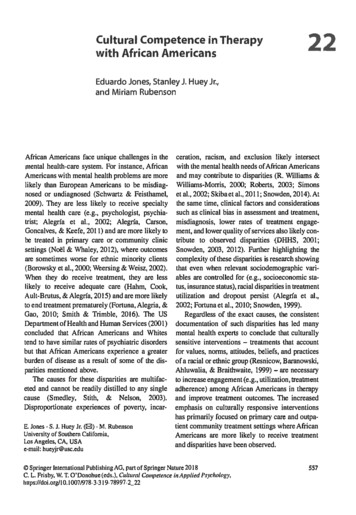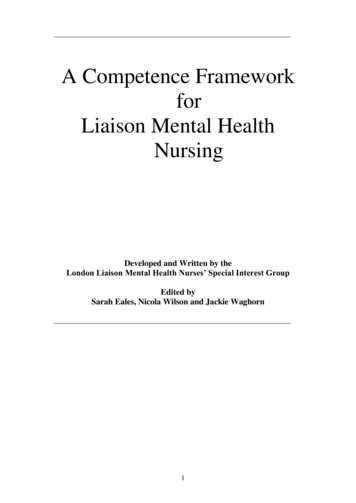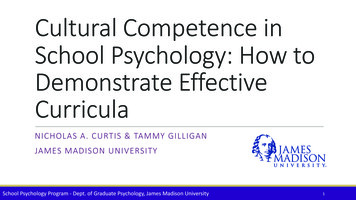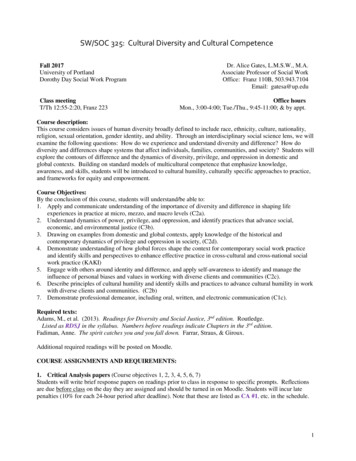
Transcription
Cultural Competence in Therapywith African Americans22Eduardo Jones, Stanley J. Huey Jr.,and Miriam RubensonAfrican Americans face unique challenges in themental health-care system. For instance, AfricanAmericans with mental health problems are morelikely than European Americans to be misdiag nosed or undiagnosed (Schwartz & Feisthamel,2009). They are less likely to receive specialtymental health care (e.g., psychologist, psychia trist; Alegria et al., 2002; Alegria, Carson,Goncalves, & Keefe, 2011) and are more likely tobe treated in primary care or community clinicsettings (Noel & Whaley, 2012), where outcomesare sometimes worse for ethnic minority clients(Borowsky et al., 2000; Weersing & Weisz, 2002).When they do receive treatment, they are lesslikely to receive adequate care (Hahm, Cook,Ault-Brutus, &Alegria, 2015) and are more likelyto end treatment prematurely (Fortuna, Alegria, &Gao, 2010; Smith & Trimble, 2016). The USDepartment of Health and Human Services (2001)concluded that African Americans and Whitestend to have similar rates of psychiatric disordersbut that African Americans experience a greaterburden of disease as a result of some of the dis parities mentioned above.The causes for these disparities are multifac eted and cannot be readily distilled to any singlecause (Smedley, Stith, & Nelson, 2003).Disproportionate experiences of poverty, incarE. Jones S, J, Huey Jr.( ) M. RubensonUniversity or Southern Cnlifomia,Los Angeles, CA, USAe-mail: hueyjr@usc.educcration, racism, and exclusion likely intersectwith the mental health needs of African Americansand may contribute to disparities (R. Williams &Williams-Morris, 2000; Roberts, 2003; Simonset al., 2002; Skiba et al., 2011; Snowden, 2014). Atthe same time, clinical factors and considerationssuch as clinical bias in assessment and treatment,misdiagnosis, lower rates of treatment engage ment, and lower quality of services also likely con tribute to observed disparities {DHHS, 2001;Snowden, 2003, 2012). Further highlighting thecomplexity of these disparities is research showingthat even when relevant sociodemographic vari ables are controlled for (e.g., socioeconomic sta tus, insurance status), racial disparities in treatmentutilization and dropout persist (Alegria et al.,2002; Fortuna et al., 2010; Snowden, 1999).Regardless of the exact causes, the consistentdocumentation of such disparities has led manymental health experts to conclude that culturallysensitive interventions - treatments that accountfor values, norms, attitudes, beliefs, and practicesof a racial or ethnic group (Resnicow, Baranowski,Ahluwalia, & Braithwaite, 1999) - are necessaryto increase engagement (e.g., utilization, treatmentadherence) among African Americans in therapyand improve treatment outcomes. The increasedemphasis on culturally responsive interventionshas primarily focused on primary care and outpa tient community treatment settings where AfricanAmericans are more likely to receive treatmentand disparities have been observed. Springer Intcmationnl Publishing AG, part of Springer Nature 2018C. L. Frisby, W. T. O'Donohue (eds.), C11/111ral Competence in Applied -2 22557
558In this chapter we critically assess the assump tion that culturally tailored interventions are nec essary to enhance treatment effects with AfricanAmericans. Specifically, we address three pri mary questions regarding the nexus between cul tural competence and psychotherapy outcomeswith Afiican American youth and adults. First, ispsychotherapy effective at reducing mental healthproblems with African Americans, and are thereethnic and racial differences in treatment out comes? Second, what approaches to cultural tai loring are used with African ·Americans, and isthere evidence that African Americans benefitfrom such approaches? Third, given the currentevidence base, what are promising ways to thinkabout improving treatment, including culturallytailored approaches, for African Americans?Because we favor research that incorporatesstrong methodological rigor (i.e., internal valid ity) and robust patterns across the literature, werely heavily on randomized controlled trials(RCTs) and meta-analytic reviews when possi ble. RCTs are considered the "gold standard" forassessing clinical efficacy because they involverandom assignment of participants to treatmentconditions and allow researchers to make causalinferences regarding treatment effects (AmericanPsychological Association [APA], 2002). Meta analyses involve synthesizing treatment ·out comes across multiple studies with heterogeneousdesigns while controlling for specific study char acteristics and provide more precise and reliablemeasures of treatment effects than individualstudies alone (Cohn & Becker, 2003; Westen,Novotny, & Thompson-Brenner, 2004).Overview of Psychotherapy Effectswith African AmericansPsychotherapy is a form of treatment for mentalhealth proble s that typically involves a thera peutic relationship between a clinician and clientin which the clinician attempts to reduce the dis tress of the client through inducing changes in theclient's feelings, attitudes, and behavior (Frank &Frank, 1993). The clinician may do this throughverbal dialogue or prescribed written (e.g.,E. Jones et al.thought record, trauma narrative, expressive Writ ing) or behavioral assignments (e.g., deep breath ing, exposure exercises). Many therapies involvea variety of treatment techniques, and one of themost common types of therapy, cognitive.behavioral therapy, includes a focus on both in.session dialogue between the therapist and clientand prescribes.between-session homeworkassignments (Beck, 2 11). Therapy can occur in avariety of settings including primary care,pcommunity-based clinics, university-basedresearch clinics, college counseling centers,inpatient centers or hospital settings, addictiontreatment centers, private practice settings, clients'homes, and prisons, among others. Most of theliterature on psychotherapy has focused ontreatment delivered in university- andcommunity-based settings.Literature reviews of psychotherapy outcomesfor Afiican Americans are cautiously positive, par ticularly those focused on youth. Huey and Polo(2008) found numerous evidence-based treatments(EBTs) for African American youth with conductproblems (e.g., cognitive-behavioral treatment,multisystemic therapy [MST]) and fewer for otherpsychosocial problems including test anxiety (e.g.,anxiety management training), ADHD (e.g.,behavioral therapy combined with stimulantmedi cations), suicidality (e.g., MSn, andtrauma related problems (e.g., resilient peertraining). Effects sizes were in the low-mediumrange on average for studies using AfricanAmerican sam ples (d 0.35). 1Reviews of psychotherapy outcomes forAmcan American adults generally support itseffectiveness. Carter, Mitchell, and Sbrocco(2012) reviewed 14 studies of psychosocialtreat ments for African Americans with anxietydisor ders including panic disorder withagoraphobia, posttraumatic stress disorder (PTSD),obsessive compulsive disorder (OCD), and socialphobia. Although only three RCTs were included intheir review, each found positive treatmenteffects.1Cohen's dis the most common effect size estimate used forclinicnl trinls. It represents the standnrdized mean dif ference in outcomes between treatment and comparisonconditions. Cohen (1988) considered n d or 0.2 ns smalleffect, 0.5 as medium effect, and 0.8 as a large effect.
22Cultural Competence In Therapy with African AmericansHarrell's (2008) review focused broadly oncognitive-behavioral therapy (CBT) for ethnicminority adults and summarized four RCTsaddressing outcomes specifically for AfricansAmericans. Those four trials provide support thatCBT is effective for African Americans withdepression, PTSD, panic disorder with agorapho bia, and substance abuse.Taken together, the available literature indi cates that psychosocial interventions, includingthose without explicit cultural tailoring, workwith African American adolescents and adults(see Table 22.1 for list of some EBTs with AfricanAmericans). However, gaps in the literatureremain (Huey, Tilley, Jones, & Smith, 2014),including the near absence of African Americanclients in some treatment areas (e.g., Williams,Powers, Yun, & Fon, 2010). Additionally, ques tions remain regarding whether there are racial/ethnic disparities in treatment outcomes. In otherwords, is psychotherapy as effective for AfricanAmericans as European Americans?559Table 22. 1 Examples or EBTs for African Americanswith behuvioral health problemsTurget tsSchizophreniaAdultsSmokingAdultsSubstunce useproblemsYouthAre Treatment Effects Similar Across EthnicGroups? To assess whether treatment is equallyeffective (i.e., ethnic invariance) or less effective(i.e., ethnic disparity) for African Americans com pared with European Americans, we summarizedreviews that compared treatment outcomes forthese two ethnic groups. Research on youth focused treatments (i.e., those aimed at clients18 years old or younger or their parents) generallyfound that there are no reliable differences in treat ment outcomes by ethnicity, with a few caveats.Huey and Jones (2013) summarized findings fromfive meta-analyses of treatment outcomes withyouth and adolescents and found no consistent dif ferences by ethnicity; however, these studiesexamined treatment outcomes for EuropeanAmerican youth compared with ethnic minorityyouth and did not eKplore effects for AfricanAmericans specifically. Huey and Polo's (2008)review reflected a similar finding - three studiesshowed superior treatment outcomes for AfricanAmericans compared with European Americans,one study found superior outcomes for EuropeanAmericans compared with African Americans,and seven found no significant ethnic oblemsMixed/comorbidproblemsYouthRepresentutive EBTsBehuvioral treatment stimulant medication(Arnold et ul. 2003)Group CBT (Ginsburg &Drake2002)Punic control therapy(Curter, Sbrocco, Gore,Marin, & Lewis 2003)MST {Borduin et 111. 1995)Attachment-based familytherupy {Diamond, Reis,Diamond, Siqueland, &Isaacs2002)Collaborative cure fordepression (Are4n et al.2005)Assertive communitytreatment (Kenny et al.2004}CBT plus nicotinereplacement therupy(Murray, Connett, Buist,Gerald, & Eichenhom2001)Group CBT (Webb, deYbarra, Baker, Reis, &Curey20!0)Multidimensionul familytherapy (Liddle, Dnkor,Turner, Henderson, &Greenbaum2008)Contingency management(Milby et al. 1996)MST (Huey et al. 2004)AdultsNia empowermentintervention (Kaslow et al.2010)Youth Prolonged exposure (Foa,Mcleun, Capaldi, &Rosenfield 2013)Adults Prolonged exposure (Feske2008)Youth RECAP intervention(Weiss, Harris, Catron, &Han 2003)Adults Seeking safety (Bodenet ul. 2011)Note: ADHD, attention-deficit/hyperactivity disorder;CBT, cognitive-behavioral therapy; EBT. evidence-basedtreatment; MST, multisystcmic therupy; RECAP,Reaching Educators, Children, und Parents
560For adults, the picture is also mixed, with moststudies finding no significant differences in treat ment outcomes by ethnicity. Of the RCTs in theHorrell (2008) review that involved comparisonsof multiple ethnic groups, two studies found nodifferences in outcomes by ethnicity, while onefound weaker effects for African Americansreceiving CBTcompared lo European Americans.Analyses of ethnic differences in the two relevantRCTs in the Carter et al. (2012) review foundequal benefit for both European Americans andAfrican Americans. Reviews of adult eatmentsin Huey et al. (2014) also suggest that treatmenteffects are fairly robust across ethnic groups andthat, on average, psychotherapy is as effectivewith European Americans as ethnic minorities. Inother words, there was no consistent evidencethat European Americans benefited more fromtreatment compared with ethnic minorities, andtreatment was effective with minorities for themost common types of mental health problems(e.g., depression, anxiety, and substance use).In summary, the results of treatment outcomestudies generally support ethnic invariance in psy chotherapy outcomes, with three noteworthy limi tations. First, there still exist areas for whichpositive psychotherapy effects with AfricanAmericans have not been sufficiently documented(e.g., OCD). Second, many studies lacked largeenough samples of African American clients toadequately test whether treatment was as effectivefor African Americans specifically and insteadcompared treatment effects between EuropeanAmericans and ethnically mixed samples (i.e.,treatment outcomes for all ethnic minority partici pants were combined into one comparison group).Third, the reviewed literature mostly involvesclinical "efficacy studies" as opposed to "effec tiveness studies." Efficacy studies generally takeplace in well-controlled research environments(e.g., university clinics), and do not necessarilyreflect outcomes in real-world practice settings(e.g., community mental health clinics) whereAfrican Americans are disproportionately likelyto be treated (Snowden, 2014). Although it seemsreasonable to conclude that African Americansstand to benefit as much from psychotherapy asEuropean Americans, persistent evidence of dis-E. Jones et al.parities in treatment utilization and dropoutcontinues to raise questions about howpsychotherapy might be improved for thispopulation and whether culturally tailoredtreatments are necessary to reduce thesedisparities.Cultural CompetenceModels, and EvidenceApproaches,Proponents of cultural competence differ in howthey define this term but tend to agree that itinvolves having a broad awareness of culture andthe knowledge and skills to effectively treatracially and ethnically diverse clients (Sue, Zane,Hall, & Berger, 2009). Calls for increased atten tion to cultural diversity in the design, evaluation,and provision of mental health treatments beganin the mid-l 980s and culminated in the publica tion of the APA's Guidelines for MulticulturalEducation, Trai11ing, Research, Practice, andOrganizational Change for Psychologists (APA,2003). The guidelines assert that all individualshave a cultural heritage that influences theirworld view and that psychologists should strive toincrease their knowledge and awareness of theirown cultural heritage, assumptions, and biases.Psychologists are also encouraged to becomeknowledgeable about other cultures and to useculturally sensitive approaches in treatment (APA,2003). The rationale for increased atten tion toculture in the delivery of mental health services isdue to four primary concerns: (I) rapidsociodemographic changes in the US popu lationtoward more ethnic diversity (Rastogi, Johnson,Hoeffel, & Drewery, 2011); (2) a his torical Jackof inclusion of ethnically diverse par ticipants inresearch studies that constituted the empiricalfoundation of evidence-based treat ments (Mak,Law, Alvidrez, & Perez-Stable, 2007); (3)evidence of ethnic/racial disparities in treatmentutilization and dropout (DHHS, 2001; Snowden,2012); and (4) concerns that traditional evidencebased approaches were Eurocentric, based onWestern values and assumptions, and not attentiveto the worldviews of culturally diverse clients(Gone, 2011; Kinnayer, 2012; Wendt & Gone,2012).
22 Cultural Competence In Therapy with African AmericansS61Despite the rationale for increased emphasison cultural competence, scholars continue todebate how this elusive concept should be under stood and practiced, as there are no establishedstandards to determine whether a provider, inter vention, or treatment facility is culturally compe tent. Critics of cultural competence have warnedthat it may lead to overly simplistic attributionsand stereotypical assumptions of cultural differ ences based on race and ethnicity, and risks view ing these as the most salient and important factorsin clients' treatment (Sate) & Forster, 1999;Weinrach & Thomas, 2004). In theory, a focus oncultural competence involves considering numer ous facets of client diversity including genderidentity, age, sexual orientation/identity, socio economic status, disability, language, religious/spiritual beliefs, national origin, immigration sta tus, level of acculturation, educational attain ment, and historical life experiences (Whaley &Davis, 2007). However, in practice, researcherscontinue to struggle with how to account for andintegrate the multitude of client diversity factorsin treatment, and many have used ethnicity/raceas the primary factor around which to organizethe development of culturally sens1t1veapproaches. Overall, it appears that cultural com petence advocates and researchers continue tograpple with how best to broaden providers'awareness and attention lo cultural differences intreatment while minimizing the likelihood ofproviders inadvertently stereotyping clients ormaking treatment recommendations based solelyon client race/ethnicity.into treatment (Bean, Perry, & Bedell, 2002).Racism continues to be a particularly salientissue for African Americans, who report greaterexperiences of discrimination than other ethnicminority groups (Pietcrse, Todd, Neville, &Carter, 2012). Such experiences are associatedwith increased psychological distress and poorerpsychological functioning (Pieterse et al., 2012)and thus could be an important area for cliniciansto develop competency in discussing with AfricanAmerican clients (APA, 2003; Boyd-Franklin,1989). Similarly, working to support a positiveracial/ethnic identity may also be valuable withsome African American clients, who, in additionto reporting more perceived racism, are regularlyconfronted with negative stereotypes about theirrace (Johnson-Ahorlu, 2013). Indeed, researchshows that a positive racial/ethnic identity isassociated with several important outcomes forAfrican Americans including improved self esteem, well-being, psychological functioning,and academic adjustment (Rivas-Drake et al.,2014; Smith & Silva, 201 I). Lastly, AfricanAmericans endorse greater levels of religious andspiritual engagement compared with other ethnicgroups, and many African Americans tum to reli gious leaders and institutions (e.g., churchhomes) for support regarding mental health con cerns (Boyd-Franklin, 2010). Carefully assessingand incorporating African Americans' religiousand spiritual values into treatment where appro priate could serve to make treatment more rele vant and engaging for some African Americanclients.Some Oft-Recommended Strategies Whe11Treati11g Africa11 America11s Because there hasbeen limited empirical attention to treatmentstrategies specific to African Americans, manyclinicians refer to recommendations of scholarswho treat African Americans to increase theirown cultural competence. There appears to begeneral agreement regarding the importance ofseveral key themes in working with AfricanAmerican clients including openness to address ing experiences of racism, supporting positiveracial/ethnic identity development, and incorpo rating clients' spiritual and/or religious valuesIt is important to note that although evidenceexists supporting the relev nce of these issueswith African Americans, findings are largely cor rclational, and empirical support demonstratingthat treatment outcomes of providers who explic itly target these issues are superior to those whodo not is still forthcoming. Hence, we recom mend that clinicians use caution when imple menting these recommendations and thattreatment approaches with African Americansavoid overgeneralizing and assuming thesethemes arc relevant to all African Americanclients.
562Culturally Adapted Treatme/11 Effects Much ofthe empirical literature on improving mentalhealth services for African Americans hasinvolved culturally adapting or tailoring treat ment (Huey ct al., 2014). Typically, culturaladaptations involve systematic modifications topreexisting treatments aimed at making themmore congruent with the cultural values, beliefs,attitudes, and practices of African Americans(Huey ct al., 2014; Metzger, Cooper, Zarrett, &Flory, 2013). In a recent review of culturallyadapted interventions, Huey and colleagues(2014) summarized outcomes from fl ve meta analyses that reported treatment outcomes spe cific to African Americans (Griner & Smith,2006; Hodge, Jackson, & Vaughn, 2012; Huey &Polo, 2008; Jackson, Hodge, & Vaughn, 2010;Smith, Rodrfguez, & Bernal, 2011). For AfricanAmericans, interventions generally yieldedeffects in the small-to-medium range relative tocontrol conditions, which were comparable tothose of culturally adapted treatments for otherethnic groups.Although not specific to African Americansper se, there is some evidence to suggest that cul turally adapted treatment may be beneficial rela tive to standard .treatment approaches. First, ameta-analysis by Benish, Quintana, & Wampold,(201 I) included only those studies comparingadapted treatments to other bona fide treatments(i.e., established treatment approaches) andfound that adapted treatll!ent wus superior(d 0.32). Second, in a recent meta-analysis ofculturally adapted prevention and interventionstudies, Holl, Iboraki, Huang, Marti, and Stice(2016) found that adapted treatment was superiorto unadapted versions of the same intervention(g 0.52). Two limitations to these meta-analyticfindings arc (I) they included culturally adaptedtreatment studies directed mostly toward otherethnic minority groups and (2) they did not con trol for therapist allegiance effects, a phenome non in which the treatment condition that theresearcher favors (i.e., the culturally adaptedtreatment condition) may result in better out comes due to researcher bias (Munder, Gerger,Trclle, & Barth, 2011 ).E. Jones et al.Overall, meta--analytic results support the claimthat culturally tailored approaches are moreeffective than control conditions (e.g., notreatment) at helping African Americans with awide array of mental health concerns (e.g.,depression, anxiety, trauma, substance useproblems). Moreover, two meta-analyses withpredominantly Asian American and Latino clientssuggest that culturally tailored approaches may bemore effective than alternative treatments atameliorating mental health symptoms (Benish etal., 2011; Hall et a., 2016).Types of Cultural Tailoring with AfricanAmericans Two common approaches for tailor ing treatment for African Americans involve theuse of Afrocentric models and client-therapistethnic matching. Afrocentric frameworks seek toinfuse intervention curricula with Afrocentricvalues (Cokley, 2005) and often include didacticsthat draw on the shared cultural history and expe riences of African Americans (Belgrave, Chase Vaughn, Gray, Addison, & Cherry, 2000). Thesemodels often aim to empower African Americansby addressing experiences of internalized racism,supporting a positive racial identity, fosteringsocial cohesion and support among groupmem bers, and incorporating spiritual andfaith-based coping strategies (Banks, Hogue,Timberlake, & Liddle, 1996; Davis et al., 2009).treatments that utilize Afrocentric approaches aretypically group-based, gender-specific, andlimited to clients of African American heritage(Belgrave et al., 2000; Kohn, Oden,Muñoz,Robinsons, & Leavitt, 2002).One exemplar of the Afrocentric approach is theClaiming Your Connections (CYC) interventionfor Black women aimed at decreasing symptomsof depression while enhancing psychosocialcompetence (Jones, 2009). Intervention didacticsfocus on building healthy relationships,increasing social support, and fostering a positiveBlack female identity. The program is unique inits inclusion of literary works by Black women(e.g., bell hooks) as a tool to address issuesspecific to these women's psychosocialenvironment. The literary works are believed toaugment group pro-
22 Cultural Competence ln Therapy with African Americanscesses by allowing Black women to identify anddiscuss important themes relevant to their ownlives, identify positive role models, and promotea positive Black female concept. In a randomizedtrial, CYC was found to be effective at decreasingdepressive symptoms and perceived stress com pared to wait-list control (Jones & Warner, 2011).However, an important limitation is that CYCwas not compared to a standard EBT or to a cul turally "inert" but otherwise equivalent treat ment, so it is unclear whether the culturalclements per sc contribute to treatment efficacy.Perhaps the most common approach to cul tural tailoring involves the use of client-therapistethnic matching. Some argue that this approachmay be particularly useful with AfricanAmericans because of their shared history of dis crimination, marginalization, and abuse, includ ing by health service providers (Washington,2006). Indeed, research shows that many AfricanAmericans report a cultural mistrust of EuropeanAmericans (Benkert, Peters, Clark. & Kevcs Foster, 2006; Townes, Chavez-Korcll, &Cunningham, 2009; Whaley, 2001). For thesereasons, use of client-therapist ethnic matchinghas been advocated as a way to increase rapportwith African American clients, reduce attrition,and improve outcomes. In a meta-analysis of eth nic matching effects, Cabral and Smith (2011)found that, compared to other ethnic groups (i.e.,Asian Americans, Latinos, and EuropeanAmericans), African Americans indicated thestrongest preference for seeing a provider of theirsame race (d 0.88). Moreover, those who wereethnically matched viewed their therapists morepositively than those matched with a therapist ofa different ethnicity (d 0.59) and experiencedsignificantly better outcomes compared withthose who were not ethnically matched, althoughthe effect was small (d 0.19). T he finding thatethnic matching was associated with improvedtreatment outcomes (e.g., reduced symptoms ofanxiety/depression) was unique to AfricanAmerican clients and was not found for AsianA mericans, Latinos, or European Americans.Why might ethnic matching be associatedwith better outcomes for African American cli ents? Some research suggests that African563American cl icnts who arc ethnically matchedmay be more inclined to disclose informationthat they might not otherwise disclose if seeing aprovider of a different ethnicity. lbaraki and Hall(2014) found that African American clients whowere ethnically matched were ten times morelikely than unmatched clients to discuss sub stance use problems and also more likely toallend three more treatment sessions. Samplesel al. (2014) found that African American womenwlio were interviewed by a same race provider, asopposed to a European American provider,reported higher levels of daily strcssors and weremore likely to disclose experiences of intimatepartner violence. These findings suggest that forsome African American clients, ethnic matchingmay increase clicnl-lhcrapist rapport and lead todiscussion of more vulnerable content that they.might not otherwise share, perhaps due to cul tural mistrust, experiences of discrimination, orstereotype threat (Abdou & Fingerhut, 2014;Whaley, 2001).However, a major limitation is that nearly allethnic matching studies are correlational indesign, leaving open the possibility that ethnicmatching effects might be spurious or accountedfor by other factors. Indeed, the one experimentalstudy we know of with symptomatic AfricanAmericans found ethnic matching effects thatwere counterintuitive in nature. Genshaft andHirt (1979) assigned impulsive African Americanand European American youth to self-controltraining led by either a Black or White peermodel. Unexpectedly, both European Americana11d African American youth showed the greatestimprovement in self-control responses whenassigned to White models. This rare experimentalstudy of ethnic matching suggests that ethnicmatching may not always be beneficial forAfrican Americans. One possibility is that ethnicmatching more often benefits those AfricanAmericans who report a cultural mistrust ofEuropean Americans or who express a strongpreference for an African American therapist(Townes ct al., 2009).Ca11 Cultural Tailoring Be Harmful? Many cul tural adaptations reported in the literature are
564theoretically grounded, but most lack the rigor ous empirical testing needed to validate their effi cacy relative to culturally unadapted. treatments(Huey et al., 2014). This can present a challengeto improving treatments for African Americansbecause adaptations that are intuitively appealingmay not in fact be more effective; some may evenyield poorer outcomes for African Americans. Incontrast, some standard EBTs that appear mini mally relevant to culture may result in better out comes. Three recent studies evaluating culturallyadapted interventions for African Americansillustrate these concerns. First, Kliewer et al.(201 l) conducted an RCT comparing the effectsof a standard expressive writing intervention andculturally adapted intervention on emotional!ability and aggressive behaviors in violence exposed, African American youth. In the stan dard condition, youth were instructed to writeabout their deepest thoughts and feelings regard ing violence they had witnessed or experienced.In the culturally adapted treatment, youth wereinstead allowectto express themselves using rap,spoken word, poetry, songs, or skits about vio lence and were encouraged to share their workwith their classroom peers. The researchersassumed that such an adaptation would fit withthe oral tradition of African American culture andbe more engaging for Black youth. Surprisingly,the culturally adapted version was significantlyless effective than the standard writing interven tion at reducing youth aggression and mood!ability at 2-month post-intervention.Second, Webb (2009) compared the efficacyof a culturally adapted self-help smoking cessa tion guide for African Americans with a standard,unadapted guide. Th
most common types of therapy, cognitive. behavioral therapy, includes a focus on both in. session dialogue between the therapist and client and prescribes.between-session homework assignments (Beck, 2 11). Therapy can occur in a variety of settings includin










